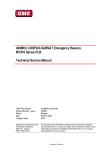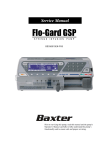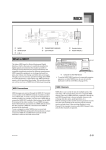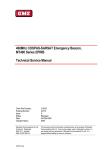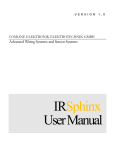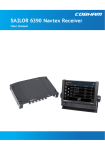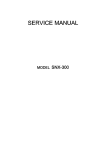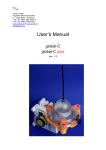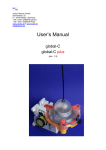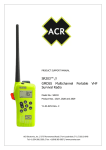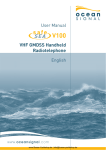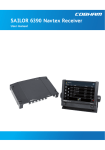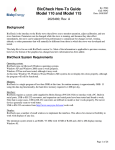Download mcmurdo NAV-7 Service manual
Transcript
SMARTFIND GMDSS NAVTEX Service Manual Commercial in confidence Table of Contents 1. Introduction ........................................................................................................ 4 1.1. Scope ............................................................................................................ 5 1.2. Applicability ................................................................................................... 5 1.3. Product History.............................................................................................. 5 1.4. Servicing equipment...................................................................................... 5 1.5. Safety notices................................................................................................ 6 2. Assessment ........................................................................................................ 7 2.1. Maintenance tasks ........................................................................................ 7 2.2. Routine testing .............................................................................................. 7 2.3. Assessment................................................................................................... 7 3. Maintenance procedures ................................................................................... 9 3.1. Inspection...................................................................................................... 9 3.2. Functional test ............................................................................................. 10 3.3. Disassembly ................................................................................................ 12 3.4. Reassembly ................................................................................................ 17 3.5. Leak Testing................................................................................................ 20 3.6. Factory Reset .............................................................................................. 20 3.7. Receiver alignment – checking only ............................................................ 20 3.8. System Restart............................................................................................ 21 3.9. Software Download ..................................................................................... 21 4. On-ship assessment ........................................................................................ 22 5. Fault finding...................................................................................................... 24 5.1. On-ship fault finding .................................................................................... 24 5.2. Fault finding in workshop ............................................................................ 25 5.3. System Block Diagram ................................................................................ 27 5.4. Service Bulletins.......................................................................................... 28 5.5. Software Release Notes ............................................................................. 29 6. Repair procedures............................................................................................ 29 7. Spares ............................................................................................................... 30 Appendix 1: Specification....................................................................................... 31 Appendix 2: MESSAGE STRUCTURES.................................................................. 32 Appendix 3: Sea Trial Check List ........................................................................... 36 This document is McMurdo Ltd copyright (©) and contains proprietary owned intellectual property rights and confidential data. All rights are strictly reserved. The information must not be used except for the agreed purpose. Unauthorized use, reproduction or issue to any third party is not permitted without the prior written authority of McMurdo Ltd. This document is to be returned to McMurdo Ltd when the agreed purpose is fulfilled. SMARTFIND NAVTEX service manual Page 3 Commercial in confidence 1. INTRODUCTION NAVTEX is a method of transmitting navigational warnings and weather forecasts from designated coast radio stations. All English language transmissions are made on 518 kHz. Each station is allocated several time ‘slots’ during the day, when it is permitted to transmit; these are normally at four hourly intervals. The only exceptions to this are gale warnings and search and rescue messages, which may be transmitted at any time. Subject to IMO approval, additional local language transmissions may be made on 490 kHz and on 4209.5 kHz. Reception of NAVTEX is normally limited to an area of 200 - 300 miles radius around each transmitting station, although greater ranges are possible at night. The SMARTFIND NAVTEX has been designed to the latest European and International specifications to provide up to date weather and marine safety information to commercial vessels. It meets IMO requirements under GMDSS: IMO MSC.148 (77) and IEC 61097-6 (Ed 2.0). Installation is straight forward. Connect the SMARTFIND NAVTEX to a 12 or 24 volt DC supply and connect a suitable antenna. Switch it on, and it will start displaying and storing NAVTEX messages without further manual intervention. Note that if there are only a couple of NAVTEX stations within range it may be several hours before the first message is received. If you are within a sea area where you are able to receive messages from multiple NAVTEX stations (particularly at night), you may be quickly overwhelmed with information. It can therefore be set up to display only those stations and message categories you want to receive and which are applicable to the sea area in which you are sailing. Normally, routine messages are repeated at four hourly intervals. Provided that the SMARTFIND NAVTEX is left running, repeated messages are not displayed more than once. Each message is retained for three days (72 hours) after its last reception before being automatically deleted, unless the message has been marked as locked. The SMARTFIND NAVTEX can be installed with either the bulkhead-mounting bracket or the flush panel mounting kit provided with the product. The SMARTFIND NAVTEX contains 3 receiver channels, tuned to 490 kHz, 518 kHz and 4209.5 kHz. The SMARTFIND NAVTEX will receive on all 3 frequencies simultaneously in those parts of the world where transmissions are available. The SMARTFIND NAVTEX is capable of being connected to an Integrated Bridge System (IBS), transferring NAVTEX messages to other navigational aids if required. Note that the IBS must be compliant with the serial port requirements of IEC61097-6 (Ed 2.0). The SMARTFIND NAVTEX will accept UTC time & date information from the IBS port if available. UTC time & date will be used to timestamp received NAVTEX messages. Note: The USB port on the back of the unit is not operational. SMARTFIND NAVTEX service manual Page 4 Commercial in confidence 1.1. Scope This manual provides the instructions to enable routine and emergency servicing of the NAVTEX equipment listed below. This manual represents the original equipment manufacturer’s (OEM) service documentation applicable to these products. 1.2. Applicability This manual applies to the following NAVTEX equipment: i McMurdo SMARTFIND NAVTEX Part number 93-001-001A 1.3. Product History 10/07/2010 – Entered production. 06/04/2011 - 93-721Z issue 2, routine software update released as V12.25. 1.4. Servicing equipment The following tools and equipment are required to carry out the servicing detailed in this procedure. Equipment: Active antenna (93-062A or 93-63A or equivalent) Bench power supply, 12-24V @ 2 Amps minimum RS232/USB to RS422 converter and cable (93-058A) to connect to a PC. Multimeter Handtools: Calibrated torque driver (40-50cNm) with attachments: 5mm A/F socket Small cross-headed screwdriver (No.1 Pozidrive) Optional PC with NMEA send/receive program or GPS data Navtex message sender (Futronic GMDSS testbox or PC – see 3.2) SMARTFIND NAVTEX service manual Page 5 Commercial in confidence 1.5. Safety notices Please read the following information for your safety: This product has been assessed as presenting negligible hazard in a sealed serviceable state. Safety analysis The following table summarises the nature of the hazard which may be present when the unit is opened or serviced; each hazard is discussed at greater length in the detailed sections. Hazard cause High Voltage Hazard identification Risk of shock Precautions Handle appropriately, contact avoid General precautions for chemical agents (adhesives, greases, IPA) Observe all safety precautions relevant to the country of operation. As a general rule, protective overalls, gloves and goggles should be worn when handling chemical agents, but different countries may have additional requirements which must be observed. Ensure that all chemical agents are handled in accordance with the manufacturer's instructions, and that suitable protective clothing is worn. Make sure that the working area is well ventilated, and that chemical substances are not left exposed. Observe good hygiene practices; do not eat, drink or smoke when handling chemicals. Read the manufacturer's instructions before using any chemical agent. Wear goggles Wear overalls Wash hands Wear gloves 1.6. Anti-static precautions The electronics section of the SMARTFIND NAVTEX is sensitive to electrostatic discharge (ESD) which can cause immediate or hidden long term damage. It is important that the PCB is only handled under suitable anti-static conditions. Ideally, a fully grounded workstation, which has conductive surfaces to avoid the build up of static charge, should be used. As a minimum, the operator must be connected to a good earth point through a resistance of 1MOhm. This is usually achieved by wearing a suitable wrist strap. SMARTFIND NAVTEX service manual Page 6 Commercial in confidence 2. ASSESSMENT 2.1. Maintenance tasks Service providers are reminded that it is their responsibility to ensure that the procedures herein are followed, that only McMurdo Ltd approved parts are fitted, and that good practice is observed. The functions which can be performed by service providers are: i i i i i Routine testing Software updating System set up Fault diagnosis Repair 2.2. Routine testing The SMARTFIND NAVTEX has automatic Built In Test Equipment (BITE). BITE runs all the time in the back ground and monitors for correct operation of the receiver sub systems including the monitoring of antenna supply current. In the event of an error being detected; i i i i i A fault indication icon may be displayed on screen Front panel LED may flash (according to menu set up option) Buzzer may sound (according to menu set up option) Detail of the alarm event is displayed under the Alarm mode, current alarms page. Alarm events are sent over the data interface output port(s) using the ALR sentence format. Whatever the reason for the return the SMARTFIND NAVTEX must be subjected to a full assessment before any other action is taken. The agent has the responsibility to ensure the SMARTFIND NAVTEX is completely serviceable and is fit for its purpose. Included in the user handbook are full details of: i Installation i Set-up i Operation Therefore these items are not repeated in this manual. 2.3. Assessment Every SMARTFIND NAVTEX returned for servicing must be fully assessed to determine its operational status. Assessment form The assessment form, shown on the next page, is an essential tool in performing diagnosis. It may be used to support customer billing and must accompany any warranty return to the manufacturer. SMARTFIND NAVTEX service manual Page 7 Commercial in confidence SMARTFIND NAVTEX ASSESSMENT Ref Date Customer Address Type Serial No Antenna type: Vessel name: Customer comments Warranty claim Return to Customer? YES/NO INSPECTION/DIAGNOSIS Items Returned x x x x Main unit Antenna/bracket Power cable Manual Item Condition Software version:________________________ DIAGNOSIS FUNCTIONAL TEST ATE (in factory only) Functional Test Burn-in Comments New Parts Fitted RF PCB Keypad LCD Display PCB Gasket Backbox Conclusions x x x x x x PCB Serial no’s: Assessed by Signed Date Pass SMARTFIND NAVTEX service manual Fail Page 8 Commercial in confidence 3. MAINTENANCE PROCEDURES 3.1. Inspection The SMARTFIND NAVTEX should be inspected prior to any servicing/repair work. The following should be inspected: i Case – ensure no cracks in the plastic or other damage i Screen – inspect display for damage and condition i Rear connectors – ensure pins are straight and connectors are in good condition i Key pad - check operation SMARTFIND GMDSS NAVTEX Operation When powered, the SMARTFIND GMDSS NAVTEX will begin boot up. The start up page will be displayed which shows the company address and telephone numbers (7), the company name (8), and the current installed firmware release (9). 1 8 2 9 mcmurdo 3 mcmurdo 4 SMARTFIND GMDSS NAVTEX McMurdo Portsmouth PO3 5PB Tel 023 92 623 900 Fax: 023 92 623 998 Email [email protected] SMARTFIND GMDSS NAVTEX 7 GMDSS NAVTEX SMARTFIND NAVTEX service manual 5 6 Page 9 Commercial in confidence 1. 4 Soft keys. Used to select various menus and options. The function of each is displayed on the screen next to the key. 2. Display key. Press and release to control the back light. Press and hold to control the contrast and brightness of the display. Also used to switch between day and night mode. 3. Cursor key (Up/Down) used to navigate the display and to control brightness when the display key pressed. 4. Cursor key (Left/Right) used to navigate the display and to control contrast when the display key pressed. 5. SMARTFIND GMDSS NAVTEX Status LED. Indicates unit is booting up, Alarm activation, messages etc… 6. Enter Key. Used to confirm data entries, Acknowledge incoming messages, Press and hold to enter engineering service mode. You will be prompted for a password which is SERVICE. Use the cursor key pad to move around the onscreen keyboard. 3.2. Functional test It is recommended that the unit is set up with an active antenna and tested to ensure that messages are received on all channels and decoded correctly. Alternatively a PC can be set up with a signal generator to test the receivers. Please see the following page. An external GPS and printer used to test the two data communications ports (COM1 & COM2). The following should be checked: i i i i i Check receiver operates OK on all 3 channels Check basic controls Check LCD contrast and brightness – ensure LCD temp does not exceed +70C ( back light life rating is 20,000 hours continuous operation). Check time and date (note that there is no back up battery in the SMARTFIND NAVTEX, therefore the time and date will be incorrect after a power cycle) Ensure data ports COM1 & COM2 operate correctly The following section shows an example of a test setup which can be used to simulate NAVTEX messages (example is for 518kHz). Caution: 12VDC is present on antenna connector whenever antenna power is “enabled” in the setup menu. Care should therefore be taken when connecting to external test equipment that can be damaged by DC voltage across its input. If in any doubt, set antenna power to “disabled” before making the connection. SMARTFIND NAVTEX service manual Page 10 Commercial in confidence SMARTFIND NAVTEX service manual Page 11 Commercial in confidence 3.3. Disassembly Warning: the backlight for the display is powered by 250V AC. Observe Anti-static precautions, a clean room environment is recommended when opening the case especially when replacing the LCD screen. Isolate the equipment by disconnecting all outside connectors. Back Box removal 1. Remove the 6 off self tapping screws 2. Lift off the back box and disconnect the ribbon cable. 3. Care should be taken not to damage the seal. This normally is retained in the groove in the rear case SMARTFIND NAVTEX service manual Page 12 Commercial in confidence RF PCB Removal 1. Remove the 4 off connector clamps (see above) using 5mm socket or nut runner. Connector clamps 2. Remove the 3 off screws from the PCB. Note that one screw may be secured into a pillar and so will be of a different type. SMARTFIND NAVTEX service manual Page 13 Commercial in confidence Display PCB removal 1. Unplug the white backlight power supply cable leading to the display. Warning: Handle with care, there is 250V AC on this cable when equipment is powered up and it may still carry a small residual charge. 2. Remove the silver tape link. It is recommended that this is not reused. SMARTFIND NAVTEX service manual Page 14 Commercial in confidence 3. Release the lock and disconnect the ribbon connector. Slide clamp as indicated below 4. Remove the 11 OFF self tapping screws. SMARTFIND NAVTEX service manual Page 15 Commercial in confidence Removal of LCD Screen NOTE: This should only be done in clean room conditions – any dust present may be attracted to the screen and will show up when next powered up. 1. Follow previous instructions to remove back box and display PCB. 2. Remove the keypad – this lifts out. Pull carefully from top and bottom – take care not to tear the keypad. 3. Remove the 4 off screws and washers retaining the display. 4. The display can now be lifted out. If the LCD is being re-used cover the screen immediately to protect from dust or place in a anti-static bag. The fascia/window assembly is supplied complete – if it is damaged please order a replacement assembly. SMARTFIND NAVTEX service manual Page 16 Commercial in confidence 3.4. Reassembly Reassemble fascia/display 1. If fitting new fascia/window remove protective film from inside of screen before fitting LCD. 2. Fit ribbon cable to display. Ensure that the insulated side is away from the PCB. 3. Remove film from LCD and place LCD on to fascia. 4. Secure 4 off screws and washers to 50cNm. 5. Fit the keypad and press home securely. Ensure that the top of the pillars are level with the top of the keypad. SMARTFIND NAVTEX service manual Page 17 Commercial in confidence Refit Display PCB 1. Replace Display PCB on to fascia and reconnect the ribbon connector – ensure the locking mechanism is secure. 2. Reconnect the backlight. 3. 4. 5. 6. Fit the 2 off screws indicated above and tighten all to 50cNm. Fit the remaining 9 off screws to 50cNm. Check that all the keyboard keys operate correctly. Fit link – this provides an earth link and problems with the backlight will occur if not fitted. SMARTFIND NAVTEX service manual Page 18 Commercial in confidence Back Box Ensure that pillar (if fitted) is tight before reassembly. 1. Fit RF PCB into back box and secure 3 off screws to 30cNm. 2. Fit 4 off Connector clamps with screwlock (Loctite) and secure to 30cNm. 3. Refit back box gasket. 4. Reconnect the ribbon cable. 5. Place back box in position, ensure gasket is in position and secure with 6 off screws to 30cNm. SMARTFIND NAVTEX service manual Page 19 Commercial in confidence 3.5. Leak Testing The SMARTFIND NAVTEX is not a sealed unit. Therefore there is no requirement to leak test the product. However if the unit is flush mounted then the front fascia is approved to IEC60945-4 for protected equipment. 3.6. Factory Reset In set up mode there is an option for FACTORY RESET. This should be used with caution. This will return all user configurable settings to the factory default – including resetting the two serial port parameters to default settings. It will not reset the receiver PCB DAC settings (see 3.7 below). It will not delete NAVTEX messages. 3.7. Receiver alignment – checking only DAC settings are not serviceable in the field because special production test equipment is required to correctly calibrate the receiver alignment. If after review the DAC settings you suspect that they are not correct contact McMurdo Ltd customer service for advice. Review of DAC settings The DAC settings are preset at PCB manufacture. The DAC settings are stored in the EEPROM located on the SMARTFIND GMDSS NAVTEX RF PCB. The settings are accessible via the service panel as follows: H Switch on SMARTFIND GMDSS NAVTEX and wait for the start up screen to disappear. H Press and hold the ENTER key H Using the soft keys select VIEW RECEIVER OPTIONS H Then VIEW SYSTEM OPTIONS H Then RECEIVER SETUP H You will then be prompted for a password H Press and release the ENTER key and enter the word SERVICE. H When complete select DONE on the keyboard H Then select VERIFY PASSWORD. This will display the service screen which will include the DAC settings. View the figures for the 518kHz receiver, 490kHz receiver, 4209.5kHz receiver, the AGC reading and the RSSI setting. The 518, 490 and 4209.5 kHz figures are the settings for the three VCO’s. The AGC (Automatic Gain Control) is the figure used to set the bias voltage input to the AGC circuitry and thus control the gain of the LNA located on the RF PCB, RSSI is figure used to calibrate the signal strength indicator bar. Typical figures for these parameters are shown below. 518kHz: 141 SMARTFIND NAVTEX service manual AGC: 80 Page 20 Commercial in confidence 490kHz: 138 4209.5kHz 125 RSSI: 017 These are typical figures and may vary plus or minus but should always be around these values. Note: 140 is the default figure for the three VCO’s. If all three receives show 140 as their set value the correct settings may have been lost or overwritten. Contact McMurdo Ltd customer service for further advice. Note: If the RSSI shows a value of 000, the RSSI will need to be reset and calibrated. Contact McMurdo Ltd customer service for further advice. 3.8. System Restart The following key sequence allows the SMARTFIND NAVTEX to be rebooted without disconnecting the power: Press and hold the ENTER and BACKLIGHT keys for three seconds, upon release the unit will restart. 3.9. Software Download Consult service bulletin list, software up dates may be issued from time to time. SMARTFIND NAVTEX service manual Page 21 Commercial in confidence 4. ON-SHIP ASSESSMENT Also refer to APPENDIX 3: SEA TRIAL CHECK LIST General information regarding optimising NAVTEX Reception When sailing within a published NAVTEX service area, reception coverage can extend as far as 200 - 300 nautical miles. If the NAVTEX signal has to cross land to any significant extent, attenuation may occur and this can reduce the reception range to as little as 50 miles. Range can increase significantly at night; it can sometimes extend to as much as 1000 miles. Some NAVTEX stations reduce transmitter power at night to avoid overlap of signals into other sea areas. Background electrical noise in harbor, the presence of high cliffs and the masts of surrounding vessels can all contribute to poorer NAVTEX reception when in harbor rather than at sea. To ensure the best reception possible the NAVTEX antenna must be located in a zone that is free of other electrical equipment. Take care to avoid locations that are close to wind generators, battery chargers, shore power transformers and any associated electrical power wiring. If there is any doubt regarding the suitability of a proposed location, first make a temporary test installation to confirm that the reception performance meets requirements before committing time and effort to a full antenna installation that may later have to be changed. System Grounding It is mandatory to have a grounding connection made to the earth terminal on the rear side of the case. This will lower the signal to noise ratio and increase the sensitivity of the system and hence the range of reception, Ensure that the 1/8” spade terminal ground pin at the SMARTFIND NAVTEX is connected to a good electrical ground. This should be the ship’s hull or a specially installed ground plate, or the keel bolts on a non-encapsulated keel or bonded hull skin fitting. Use a minimum cable size of at least 1.5 mm2. Check the installation guidelines for the antenna type being used to ensure its correct grounding requirements are complied with. Note that connection to an inappropriate or electrically noisy ground point can sometimes give unpredictable results and may even reduce overall reception performance. Consequently, do not make a new ground connection and assume that it will make things better; always check that reception is better before committing to that connection. Isolating sources of on board interference The ‘Setup mode Receiver options’ monitor window can be used to display NAVTEX reception in real time. Use it to prove that the system is receiving correctly. The information shown on the monitor page is totally independent of normal operation, station and message type selection filters. As soon as live NAVTEX reception is detected, received information will start to flow across the display in real time. Non-printing, transmitter-idle and phasing characters are displayed as well as actual message text. Select the required NAVTEX channel using the Monitor Source’ menu option. SMARTFIND NAVTEX service manual Page 22 Commercial in confidence When reception quality is good, the error rate will be low (<4%). The error rate is calculated as an average over a large number of received characters. Wait until the next scheduled transmission time of a distant NAVTEX station (100 miles or more away). Use the monitor facility (receiver options page) to view received messages as they are received in real time. 1. Turn off all sources of AC power usage, battery chargers, inverters, generators and shore power. Note any improvement to the average reception error rate. 2. Turn back on each source of AC power usage, one at a time, noting any increase in reception errors which may indicate a source of local interference worthy of further investigation. Reception errors may also be caused by close proximity of DC-powered equipment. In this case repeat the above test but include all DC-powered instruments on board as well. It is also possible to monitor for locally caused interference using an AM band radio set to 531kHz or SSB set tuned to the appropriate NAVTEX channel. Listen to the general ‘on channel noise’. Switch off equipment until the general noise level is reduced and then wait for a transmission to see if there is an improvement in reception. Evaluating antenna location When the antenna is situated high up then local interference should be reduced as it will be most distant from local electrical equipment (sources of interference). A methodical approach when evaluating a proposed sensor site would be to note down the average error rate from each station. Then make a change to the proposed sensor location, take a new set of percentage error readings and consider the options. Ideally you need to receive from at least one distant station that is 100 miles or more away or you may find it impossible to get any received error count at all. As most NAVTEX stations just transmit for a maximum of ten minutes at a time in every four hours, you will have to work quickly. Alternatively, take your time and make a new set of readings after four hours has elapsed. SMARTFIND NAVTEX service manual Page 23 Commercial in confidence 5. FAULT FINDING 5.1. On-ship fault finding No NAVTEX reception Active antenna fitted; Is 12V dc present on the antenna TNC connector socket? NO - check that it is enabled in Setup mode – Receiver options, “Antenna power enabled”. Active or Passive or wire antenna fitted; Verify antenna integrity, check cable and connecters for damage. Bad UTC or bad date displayed (with GPS connected) Note, if no GPS is connected the clock and date will stop on power down and must be reset by the user when next powered up. But if relevant UTC data is detected on the data input at power up it will override the pervious manual UTC and date settings automatically and correct the system clock time and date. 1. Confirm that the GPS is outputting relevant IEC 61162 sentences. SMARTFIND NAVTEX supports IEC 61162 & 61097-6 (NMEA) protocols. Refer to APPENDIX 2: MESSAGE STRUCTURES for detail. The source of UTC used to update the system date and clock can be extracted from various IEC 61162 sentences. Use the Setup Mode – Serial options to select required sentence ZDA,GGA,RMC, or GLL (in order of preference). 2. Check for live serial data in the SMARTFIND NAVTEX Serial Options setup page, serial monitor window. If data can be seen then the interface problem is not likely to be hardware or signal level related issue. 3. Try turning off the ‘NMEA Checksums Required’ setting (Serial Options setup page). Note. it is recommended to re-enable ‘NMEA Checksums Required’ once fault finding is completed and the reason for the problem is resolved. SMARTFIND NAVTEX service manual Page 24 Commercial in confidence 5.2. Fault finding in workshop Strange banding / stripes / artifacts on the LCD 1. Check the flat flexi cable between the LCD and the display PCB - replace if necessary 2. Replace the LCD module. 3. If still faulty replace the display PCB Does not start up 1. Ensure that backlight has not failed giving the impression that the unit is not starting (use a torch or bright light to view screen). 2. Open case and check for trapped backlight wires. 3. Does the red LED flash? If not check the power supply and then replace the display PCB. Backlight failed 1. Open case and check for trapped backlight wires. 2. Check for 250VAC on backlight connector, if no replace the display PCB 3. If above does not work then replace the LCD module. Poor LCD contrast 1. The LCD backlight is rated for 20,000 hours continuous operation, replace the complete display module (with backlight) to restore the contrast. It is recommended that the screen saver feature is left enabled to prolong the backlight service interval. SMARTFIND NAVTEX service manual Page 25 Commercial in confidence Testing serial data ports COM1 (15 D), COM2 (9 D) Use this procedure to verify the correct operation of each communications data port hardware. Make a loop back test. (15 D) COM 1, (normally assigned to GPS or ECDIS) The connections to the D-Sub 15-pin socket on are given below. (link TXA to RXA & TXB to RXB) To quick way to do this is to temporary connect together the following cable cores contained within the power cable provided as standard. Power, Alarm & IBS port Pin Number 1 2 3 4 5 6 7 8 9 10 11 12 13 14 15 (2m cable supplied) Connection NAV-7 Cable Colour Notes IBS_TXA O/P WHITE/BLUE O/P to IBS port +V (12/24 V DC nominal) -V (0V) I/P RED/BLUE Ship’s supply +ve I/P BLUE/RED Ship’s supply -ve IBS_TXB O/P BLUE/WHITE O/P to IBS port AUX_NC AUX_NO AUX_COM O/P O/P O/P ORANGE/WHITE WHITE/BROWN WHITE/GREY Alarm Relay NC Alarm Relay NO Alarm Relay COM IBS_RXB IBS_RXA I/P I/P GREEN/WHITE WHITE/GREEN I/P from IBS port I/P from IBS port Make a loop back test plug (9D) COM 2 (normally assigned to printer or PC) The connections to the D-Sub 9-pin socket on are given below. (link TXA to RXA & TXB to RXB) A spare 9 D plug connector should be wired as follows; NMEA 0183 & printer port Pin Number 1 2 3 4 5 6 7 8 9 Connection Notes SER_TXB O/P to NMEA 0183 (printer) SER_RXB I/P from NMEA 0183 SER_TXA SER_RXA O/P to NMEA 0183 (printer) I/P from NMEA 0183 With the loop back connector in place check for serial data being echoed back in the serial monitor window. A regular ALM sentenced should be seen and also any message text sent for printing. When data is correctly echoed in the monitor window it proves that the serial port hardware is sound. SMARTFIND NAVTEX service manual Page 26 Commercial in confidence 5.3. System Block Diagram Provided for information only. Receiver 1 Receiver 2 Signal processo r& CPU Message memory Receiver 3 IBS port IEC61162 INTEGRAL DISPLAY Printer port RS232 Outline circuit description The unit runs off a 10.8 to 31.2V DC power input protected by auto resetting fuse. A dc-dc converter provides a number of internal voltage rails used by the LCD, processor and receivers. The processor provides for control of the other sections of the circuitry. Flash memory provides for program storage, and long term storage of NAVTEX data where required. SDRAM provides for storage of volatile data. At power up an application code is decompressed from FLASH to SDRAM and the code is run from SDRAM. A buzzer is provided to confirm key presses and sound alarms. A keyboard matrix and two switches are provided for the user controls and link directly to the processor. Green LEDs provided for back lighting of the keyboard. These are of variable brightness. A red LED is provided for status warnings. Data interfaces for communicating with external equipment are provided on the 9 and 15 way rear connectors. A colour STN LCD is driven directly by the processor this has a high voltage CCFL backlight with adjustable brightness. Active and passive NAVTEX antenna types are supported by a switchable onboard power supply and current monitoring. Three parallel receivers, one to each receive frequency provide simultaneous operation at all times on each NAVTEX frequency. And employ direct conversion down to base-band to generate the I & Q signal to the demodulation software. A RSSI (Receiver Signal Strength Indicator) signal is derived from the AGC signal as a diagnostics aid. SMARTFIND NAVTEX service manual Page 27 Commercial in confidence 5.4. Service Bulletins ISSUE No. 65 06th April 2011 Subject: Reference: Release of software version 1.2.25 93-721Z Issue 2 Changes made since Issue 1 1. Antenna fault detection featured added, open-circuit and short-circuit will now indicate a system error. A new ‘Antenna Alarm’ setup menu option can be used to enable or disable this feature if the active antenna type is not compatible due to less than 4 ma current consumption. 2. Message list summary page improvements. a/ Message list summary mode can now only be entered from Index mode when the curser is resting on an ‘in date’ message ID. This stops the message list summary page cursor bar from moving out of view (off the bottom of the screen). b/ Will no longer show ‘1193046’ when the message list is empty. 3. Writing of text to the screen has been speeded up resulting in a reduction of screen re-draw flicker. 4. Demonstration mode enabled in receiver setup menu, was previously not functioning even when selected. Software Update procedure In order to download the software from a PC into the Smartfind NAVTEX an RS232 or USB to RS422 converter is required. Please contact McMurdo Customer Service if assistance is required with obtaining a suitable converter. (A recommended converter is available at www.easysync.co.uk ) Download release software and upgrade procedure documents from: ftp://ftp.mcmurdo.co.uk/pub/Software/ Issued by: Robin George,6th April 2011 To be carried out immediately ± For further information please contact: Tel: +44 (0) 23 9262 3900 Fax: +44 (0) 23 9262 3998, Email: [email protected] To be carried out during normal service ± To be carried out if required ² To be carried out only on PCB repair ± Web: www.mcmurdo.co.uk For information only ± SMARTFIND NAVTEX service manual Page 28 Commercial in confidence 5.5. Software Release Notes 06/04/2011 - 93-721Z issue 2, routine software update released as V12.25. 6. REPAIR PROCEDURES Repair policy for this product is repair by replacement of major sub-assemblies. Component level diagnosis and repair is not supported. Each PCBs can be inspected for dry joints etc but component replacement is not possible. The principal repair activity is the replacement of the circuit boards/display. Full instructions for this can be found in section 3.0 Disassembly and Reassembly. Other than this, repair is limited to replacing those parts of the SMARTFIND NAVTEX which have suffered mechanical wear and tear. Spare parts for these purposes are listed in section 7. SMARTFIND NAVTEX service manual Page 29 Commercial in confidence 7. SPARES The following items are available as spare parts/accessories: Part number Description 93-050A 93-051A 93-052A 93-053A 93-054A Display keypad Front fascia assembly 2m Interface cable (DC power) Earth cable LCD Screen 93-055A Display Back Box 93-056A 93-057A 93-060A Flat flexi cable Display and RF PCB USB/RS232 to RS422 converter Deskmount bracket kit 93-061A Bulkhead bracket kit 93-204 User manual 93-058A Contents Fascia, window seal and clear screen. LCD, copper tape, gasket Back box, label, screws and gasket Serial number and year of manufacture to be advised when ordering 16 way flexi cable Tested as a pair Converter and cable to allow software download Bracket, locking knobs, screws Flushmount Bracket, gasket and securing kit Available on website Ancillary items: Part number Description 93-062A 93-063A 93-064A 93-065A 93-066A 93-067A ANA1 - Light duty active NAVTEX Antenna with 20m cable and standoff bracket ANA2 - Heavy duty active NAVTEX Antenna with PL socket Type A stand-off mounting bracket for ANA2 Type B long reach stand-off mounting bracket for ANA2 Type C deck mount bracket for ANA2 Antenna cable kit for ANA2, 20m SMARTFIND NAVTEX service manual Page 30 Commercial in confidence APPENDIX 1: SPECIFICATION Please note that the product specification is issued in the user manual for each product. The user manual is delivered with each new product and is also available on our website. McMurdo reserves the right to change specifications without notice. SMARTFIND NAVTEX service manual Page 31 Commercial in confidence APPENDIX 2: MESSAGE STRUCTURES SMARTFIND NAVTEX service manual Page 32 Commercial in confidence SMARTFIND NAVTEX service manual Page 33 Commercial in confidence SMARTFIND NAVTEX service manual Page 34 Commercial in confidence SMARTFIND NAVTEX service manual Page 35 Commercial in confidence APPENDIX 3: SEA TRIAL CHECK LIST SMARTFIND GMDSS NAVTEX Sea Trial Check List SMARTFIND NAVTEX Installation verification report for Vessel (name); Completed by; Position; Date; Location (or port); VESSEL IDENTIFICATION INFORMATION Name Call Sign MMSI NAVTEX S/N Antenna Type RX frequencies 518 kHz supported by 490 kHz antenna 4209.5 kHz SMARTFIND NAVTEX service manual Page 36 Commercial in confidence Introduction and Scope This Sea Trial Checklist is designed to prove that the GMDSS NAVTEX receiver is working to specification in the installation to be evaluated. SMARTFIND GMDSS NAVTEX is a shipborne radio receiver designed to receive NAVTEX information, which consists of messages concerning weather and shipping conditions. The messages are transmitted by land-based transmitters on one of three frequencies: 490kHz, 518kHz or 4.2095MHz. Three separate receiver circuits allow for simultaneous reception of each NAVTEX channel. System Details Subject Date Detail (or strike out) Engineer Vessel type Unit serial number (rear label and in software under ‘setup mode’ screen). Software version (check on boot up screen) Antenna type, bracket and cable detail. (0.1.0) Or other PSU (12V / 24V / ac–dc converter etc) (AC) (UPS) ( DC Reserve Radio Supply) IBS connected GNSS NMEA provide by (RS422) (RS232 with converter) Type; GPS / IBS make & type; UTC data provided by GNSS (None)( ZDA) (GLL) ( RMC) (GGA) Printer type (option) (None) (DPU 414) (other - (ANA1) (ANA2) (Active) (passive) (wire) Other; ) Installation notes. Location of main unit; Location of antenna Approximate cable lengths to; antenna / IBS / printer; Safety Grounding point; (green rear wire connected to ships hull); Yes/No DC isolator switch location; Interfaced optional equipment; (GNSS) (IBS) (printer) (PC) SMARTFIND NAVTEX service manual Page 37 Commercial in confidence Basic System Set-up Test instruction Check that displayed UTC date is correct Desired effect Yes Check that displayed UTC time is correct Yes Check Lat Long is correct (GNSS must be connected) Check that the antenna type is reported correctly For active antenna set as ‘Enabled’ Check screen saver status Yes After workshop service List the 3 VCO DAC settings PASS/FAIL Enabled = DC voltage applied to antenna connector centre pin (Enabled) (de-selected) Ref Osc; 490; 518; 4209.5; List AGC control setting List RSSI setting offset User Settings Test instruction Message categories / station designators excluded PASS/FAIL If the user has de-selected any message categories and / or station designators then note them here. Go to Set up mode – Message filters and review status; 518,490,4209.5 (Note; X = de-selected) SMARTFIND NAVTEX service manual Page 38 Commercial in confidence System Operation Test instruction – view received messages Note down the station designators for all stations received on 490kHz Desired effect Read message text Note down the station designators for all stations received on 518kHz Read message text Note down the station designators for all stations received on 4209.5kHz Read message text PASS/FAIL Check that there are no messages displayed that Review message date are over 72 hours old (other than any locked messages) Check that there are no repeated messages Review message list displayed Ask if any users have experienced any problems with the NAVTEX such as system lock up or loss of expected data, document here … SMARTFIND NAVTEX service manual Page 39 Commercial in confidence Live System Operation 1 Test instruction – Live reception (red LED will normally flash). If there is a live transmission during the site visit then go to the SETUP MODE, Receiver options page, (NAVTEX) monitor source, select the correct receive channel – (518, 490, 4209.5) Ensure that the monitor window displays the received characters (if the station is less than 200 miles away then there should be no errors) Ensure that the RSSI bar operates (in green sector when receiving a station ) Note here any received message IDs on the monitor page – then check that these messages are displayed on the main INDEX display(s) Desired effect View data PASS/FAIL View data View (3 step level change) Review data Note. Each message must start with ZCZC and end with NNNN or it will be rejected and not appear in the message list. SMARTFIND NAVTEX service manual Page 40 Commercial in confidence Live System Operation 2 Test instruction – Serial interface ports If GNSS (GPS) or IBS is connected. Go to the SETUP MODE, Serial options page, Serial monitor source, select the correct serial, port Desired effect View data IBS port (on 15 way D connector COM1 ) Note connected device type Printer – NMEA port (on 9 way D connector COM 2) Note connected device type Verify Baud rate is set correctly for each device connected. Baud rates (115200) Ensure that the monitor window displays serial characters without corruption or errors (check both ports) PASS/FAIL (4800), (38400), Com1 IBS Port; Com2 Printer –NMEA Port; View data Pause monitor to freeze the updating Review data Note the displayed message headers and relevant port used. Review data and list the valid headers shown; RMC, GLL, ZDA GGA (UTC and position) NRX, NRQ, NMK, ACK, (NAVTEX) ALR (Status alarm) IBS Port; Printer –NMEA Port; Notes; SMARTFIND NAVTEX service manual Page 41 Commercial in confidence Notes; SMARTFIND NAVTEX service manual Page 42 Commercial in confidence SMARTFIND NAVTEX service manual Page 43 McMurdo Limited Silver Point Airport Service Road Portsmouth PO3 5PB United Kingdom Phone: Fax: Email: Website: +44 (0)23 9262 3900 +44 (0)23 9262 3998 [email protected] www.mcmurdo.co.uk 93-715 Issue 1 A Company of the Orolia Group












































